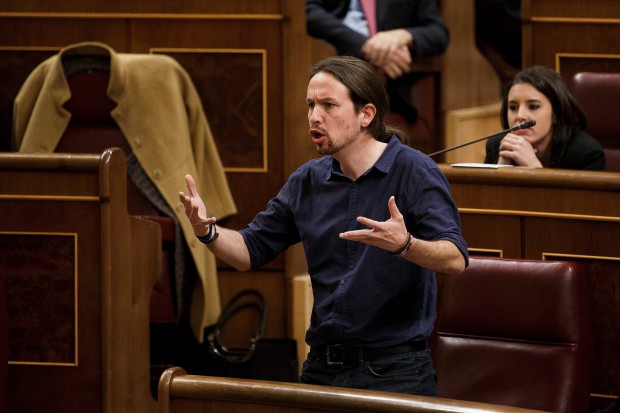Almost a month on from an unprecedentedly divisive general election, Spain seems further away from forming a new government than ever. In Madrid’s grandiose Palacio de las Cortes on Wednesday, the Spanish parliament convened for the first time since the December 20 vote, and it proved an eventful session – but not because some combination of the four main parties managed to move towards a coalition government. Division, not unity, was the order of the day.
Oaths were taken in Catalan, Basque and Galician as well as Castilian; Podemos leader Pablo Iglesias tweeted bitchy remarks about other parties during proceedings in which his political secretary vowed to rewrite the Spanish constitution; Ciudadanos leader Albert Rivera was also busy on social media, tweeting that Spain is entering a ‘second transition’; and amidst all the political crossfire, acting prime minister Mariano Rajoy reiterated the importance of a unified Spain in the face of a reinvigorated secessionist movement in Catalonia. Never has Spain’s political future seemed less certain.
Before Wednesday’s session, a leftist alliance between Socialist PSOE – who came second on December 20th, with 22% of the vote – and far-left newcomer Podemos – who came third, with 20.7% – was on the cards.
The prospect of having Podemos in government is an exciting one for many Spaniards, sick and tired as they are of the corruption scandals in which the Popular Party and PSOE, hitherto the two dominant parties, are mired. But a PSOE-Podemos partnership is looking increasingly unlikely. The arguments that are currently fracturing the political landscape in Spain are not just between left and right – they are also within the left and, to a lesser extent, the right.
PSOE leader Pedro Sanchez has ruled out any possible ‘grand’ coalition with the conservative Popular Party, instead saying he will try and form a ‘progressive’ allegiance with other left wing parties. Like anything said in Spanish parliament at the moment, though, that is much easier said than done: Iglesias has stressed that he will not join any alliance that has Sanchez at the helm. But the real source of conflict between these two parties is Catalonia, and how to handle the secessionists there. Podemos is the only party that has said it would call a referendum on Catalonian secession (preceded by the necessary constitutional change it also favours), a proposal which Sanchez vehemently opposes.
Events in Barcelona are presently just as heated as those in Madrid. Artur Mas, the former pro-independence Catalan president, stepped down at the weekend – but by no means did his departure weaken the secessionist movement. Mas’s pugnacious successor, former Girona mayor Carles Puigdemont, makes his predecessor’s fervent pro-independence efforts seem half-hearted: in a 2013 speech, Puigdemont referred to the Spanish government as ‘the invaders of Catalonia’, and declared that they would be eventually ‘expelled’ from the north-easterly province. He was quoting a Catalan journalist executed during Franco’s dictatorship. This is, quite literally, fighting talk, and has imbued the negotiations in Madrid with greater urgency.
The three parties that Rajoy wants to come together in government are, at least, in agreement that Puigdemont’s plan to separate Catalonia from Spain within eighteen months must be vigorously opposed. None of these parties would be likely to condone even a symbolic referendum on secession, such as the one that Mas held in November 2014 (and for which he was put on trial at the end of last year). But a PP-PSOE-Ciudadanos coalition would be just as difficult to achieve as the leftist alliance. To put it bluntly: Sanchez and Rajoy loathe each other. It remains to be seen whether the renewed secessionist drive in Barcelona will force the two politicians to bury their differences and join forces for the cause of Spanish unity.
Rivera’s Ciudadanos is the only party that would fit fairly easily into Rajoy’s proposed three-way coalition. Seen by many as being a younger, more media-savvy version of the Popular Party, this liberal, centre-right newcomer is fast emerging as the least troublesome party in Spanish politics. But coming as it did in fourth place on December 20, with just under 14% of the vote, it is no position to call the shots.
All of which bickering, lack of agreement, refusal to compromise and political mud-slinging mean that Spain is probably destined for a repeat general election in the coming months. Rivera’s talk of a ‘second transition’ – a reference to Spain’s original transition from dictatorship to democracy in 1975, after Franco’s death – is not hyperbole: out of Spain’s present turmoil might come great political, social and economic changes. But a morass of confusion must be cleared up, and many conflicts resolved, before it can enter a new phase of its democratic history.






Comments